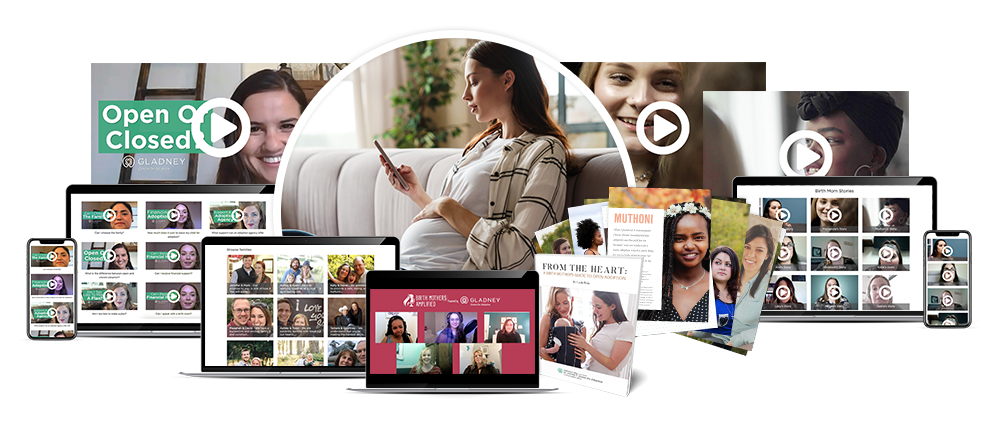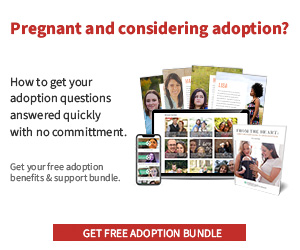Going through an unexpected pregnancy or even raising a baby can be quite a difficult task to handle when you’re not ready for it. Motherhood is hard, and thinking about someone else adopting your baby by no means equates to giving up on your baby. How do you go about placing your baby for adoption?
This article will go over the adoption placement process for both expectant mothers and mothers who are already raising their babies. I’ll also explain the positive adoption language and why it’s important for everyone in the adoption triad.
What You Should Know about Placing Your Baby for Adoption
Making an adoption plan might seem like a hard process. In fact, choosing the best adoption agencies in your state can make the process easier. An adoption attorney or adoption pregnancy counselor can be other helpful resources. You have options as you make an adoption plan for your baby. You don’t have to go through this on your own.
Should You Place Your Baby for Adoption?
There are many different circumstances that lead a mother into making an adoption plan. The mother could be facing homelessness, unemployment, or struggling to make ends meet. Perhaps she’s in an unstable relationship. Maybe she isn’t ready to raise a child, or maybe she has many goals for her future.
Placing your baby for adoption isn’t easy by any means, but think about why you’re choosing adoption. Whatever circumstance you’re in, placing your baby for adoption isn’t a bad thing. You’re selflessly thinking about what would be best for your baby.
You’re Not Giving Up on Your Baby
One of the most crucial things about adoption is that you are not “giving your baby up for adoption.” You’re “placing your baby” for adoption. This kind of positive adoption language is used today to show respect for everyone in the adoption triad and to educate others on positive adoption language.
Who You Should Talk To about Adoption
Calling a 24/7 pregnancy hotline or going to a crisis pregnancy center are good places to start. Most crisis pregnancy centers even help out after you’ve had your baby. The adoption professionals will do what they can to assist you with what you need. Such services include transportation to and from doctor’s appointments, maternity clothes, baby supplies, housing assistance, counseling, and educational classes. The adoption professionals can even assist you with finding a great adoption agency to help you find an adoptive family to place your child with.
Your Adoption Options
It’s essential to be aware of all your options, and when it comes to placing your baby for adoption, you have three to choose from.
Closed Adoption: With a closed adoption, you want to keep your life closed off from the adoptive family and your baby. This ensures your confidentiality, though there’s a chance that your baby would like to find you once they’re an adult.
Semi-open: With a semi-open adoption, it shares similarities with a closed adoption, with the exception of a first name basis, adoptive family location, and a contact barrier. With a semi-open adoption you can have updates on your child, but no visitations.
Open Adoption: With an open adoption, you have continuous contact with the adoptive family and your baby. You’ll not only receive updates, but you’ll have visits with your baby. Open adoptions are the most common and proven to be the most beneficial for everyone in the adoption triad.
What Are the Pros and Cons of Adoption?
Like with all huge life choices, there’ll be plenty of pros and cons. When it comes to placing your baby for adoption, the pros focus on the amazing life you give your child and the flexibility that comes with those decisions. You have the option of whether or not you’d like to choose the adoptive family. You get to choose how open or closed you would like the adoption to be. If you choose a closed adoption, you’ll have your privacy intact. If you choose an open adoption, you’ll get to receive updates and have visits with your baby. You get to create an adoption plan. You’ll get to have endless support from adoption professionals and from other birth mothers in support groups. You’ll know you’ve made a wonderful difference in someone else’s lives.
The main con to adoption is the emotional response. You could be at risk of depression. You may feel like you’re giving up on parenting. You can’t be the one to raise your baby once you sign your parental rights away. If you choose a closed adoption, your baby can’t have contact with you until they’re an adult. You could be stuck wondering if your baby is okay.
Despite the negatives, adoption can be an amazing experience and journey if done right. So how can you make sure everything in the adoption process goes smoothly?
Making an Adoption Plan
Starting an adoption plan is a great way to be sure that everything you want about the adoption goes as planned. Be sure to do your research about your options, attorneys, agencies, services offered, and be sure that everything seems legit. The adoption specialists can help you, but be sure that the plan is everything you want for your baby.
Working with an Adoption Agency or an Adoption Attorney
So you’ve decided on placing your baby for adoption, but you don’t know whether to work with an adoption agency or an adoption attorney. First thing is to be aware of is that both adoption agencies and attorneys can take advantage of you, so look out for adoption professionals that only think about money instead of thoroughly doing their job to find the right family for your baby.
Both agencies and attorneys will discuss your rights as a birth mother. Even while in the process of going through an adoption, you still have parental rights. You can choose your healthcare needs while pregnant, name the baby, and work out any other details that deal with the baby. Whichever you choose to work with, be sure that they fully explain the issues that you don’t understand at any time within the adoption process. Both agencies and attorneys will explain your rights and anything else that’s vital for you to know.
Choosing a Family
One of the most exciting things about adoption is getting to choose the adoptive family that’ll raise your baby. You can choose a family by looking through family profiles, and the profiles will provide some great information about the hopeful adoptive family. What are some important things to know about an adoptive family?
Pregnant and considering adoption?
Get your free adoption benefits and support bundle

Well, that depends on what your preferences are. Do you want your baby to be raised in a one or two-parent household? What about religious preferences? Does the family’s ethnicity matter to you? How about how many other children they have? Some other things to think about are occupations, neighborhoods, home environment, educational backgrounds, etc.
If you don’t want to meet the family, that’s more than okay. The adoption professional can help mediate communication between you and the adoptive parents. The adoptive family won’t take it to heart, and if they do, feel free to choose a family that’s open to not wanting to meet. Never feel pressured into doing something you truly don’t want to do.
Meeting the Hopeful Adoptive Parents
Once you’ve chosen a family, you can decide whether to meet them or not. If you do, the adoption professional can help you plan where to meet the adoptive family, and you can discuss any feelings you might have. You can also think of questions to ask the hopeful adoptive parents. Be open to any questions they might have for you as well.
It’s also crucial to be aware of the signs that an adoptive family could be deceptive. Are they paying any attention to what you’re saying? Are they making the adoption all about them? Is the couple on the same page about what they value? You can focus on body language for insight as well. The ultimate goal is for you and the hopeful adoptive parents to get to know one another and to be truly invested in what you’re saying and feeling.
Look for adoptive parents who want the best for both you and the baby and respect your needs and situation. The decision to place your baby with them is still your choice to make, and if you don’t like the family, you’re free to choose another one. Be polite and courteous, but also speak your mind and tell the adoption professional that you’d like to choose another family.
Signing Your Parental Rights
Terminating your parental rights is necessary to complete the adoption process. In most states, if you’ve just delivered your baby, you can sign away your parental rights 72 hours after giving birth. This can be a hard decision after seeing and holding your baby, and it’s your choice if you’d like to change your mind. Just remember why you made your adoption plan in the first place, and think about what raising a baby will be like for you.
Life After Adoption
There’s always help available to you if you’re ever feeling alone and lost about your decision. Birth mother support groups are a great resource. By being a part of this support group, you can hear many birth mothers’ stories and even share your own. You can talk to a trusted friend or family member. You can also talk to an adoption counselor who will help give you resources to cope with post-placement and keep everything you say completely confidential.
Adjustment can be hard after placement. It’s completely normal to have feelings of grief, resentment, and many other tough emotions, but it’s also okay to seek help. Talk to someone you trust, and talk to an adoption counselor about how you’re honestly feeling. It’s easier said than done, but remember to think about the positives.
Think about the great decision you’ve made to make a better life for your baby. Think about how you have placed your baby with a loving family and how you’ve blessed a family with a precious gift of a child. Think about how much your life has changed for the better and how you can focus on improving your life. Think about all the goals and plans you can achieve. Think about how you can prepare yourself to be ready to raise a baby when the time comes. Think about how you weren’t giving your baby up for adoption, but placing your baby with a lifelong connection through adoption.


